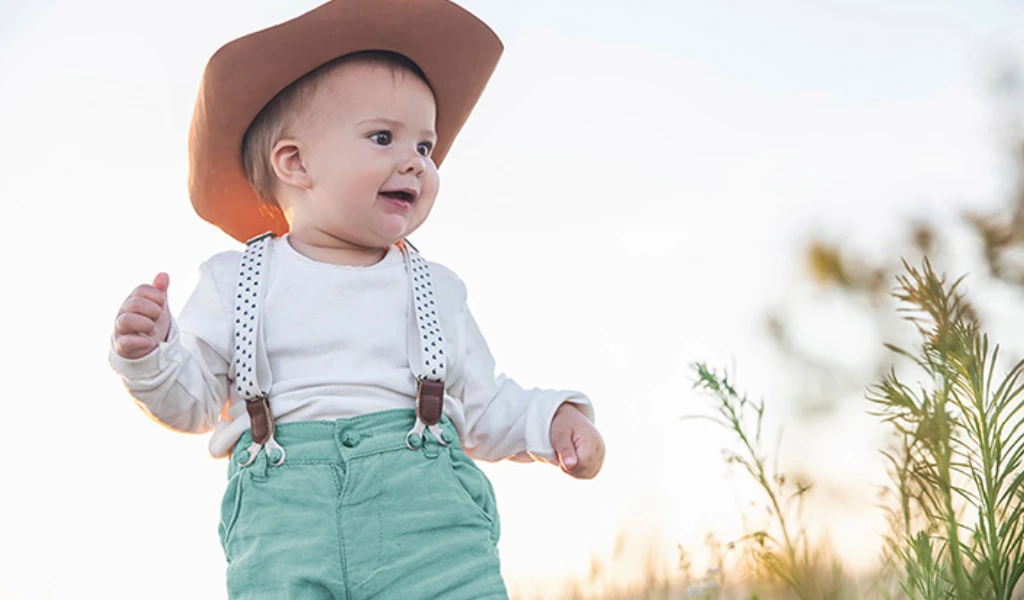Scandinavians have a particular way of naming their children, including their surnames or last names.
Scandinavia is a area in Northern Europe made up of Denmark, Norway, and Sweden. Just like the deep connections in history, language, and culture that these countries have, Scandinavian surnames also have many similarities. If you are searching for Scandinavian last names for your baby, you have come to the right place.
Historically, people in Scandinavia used a naming system based on the father’s first name. The nobility were the first to adopt family surnames, followed by craftsmen, merchants, and clergy. These last names were formed by adding a specific suffix to the father’s name. Some common suffixes included ‘-datter,’ ‘-dorrit,’ ‘-dotter,’ ‘-sen,’ ‘-sson,’ ‘-son,’ ‘-zon,’ ‘-fen,’ ‘-ler,’ and ‘-zen.’ For example, the surname Abrahamsen indicated that someone was the son of Abraham, while Eva Niklasdatter meant that Eva was the daughter of Nikla.
In this article, we have gathered a list of typical Scandinavian last names along with their meanings and histories. Keep reading to choose your surname or last name.
Famous Scandinavian Last Names Or Surnames With Meanings
1. Aaberg
The surname Aaberg comes from the Nordic words ‘aa’ which means ‘river’ and ‘berg’ which means ‘mountain or hill.’ It is thought to be Swedish in origin and can also be spelled as Aberg.
2. Aland
This last name or surname comes from a place name and is associated with the Aland Islands, located in the southern part of Finland in the Gulf of Bothnia.
3. Alfson
This surname is a version of Alfsson that has been modified for English speakers, meaning ‘son of Alf.’ Alf comes from the Old Norse word ‘alfr’ or ‘elf,’ which was the name of a king in Norse mythology.
4. Axel
This surname comes from Old Norse name ‘Asketill’ which combines ‘oss’ or ‘ass’ meaning ‘god’ with ‘ketill’ meaning ‘kettle’ or ‘sacrificial cauldron.’ Other versions of the name include Axcell, Axell, and Aksell. It is also a shorter form of the patronymic names Axelson or Axelsson.
5. Backe
The surname ‘Backe’ is a variation of the name ‘Bakke’ which has Dutch and Norwegian roots. ‘Bakke’ comes from the Middle Dutch word ‘bac’ which means a ‘bucket’ or a ‘beaker.’ This likely refers to someone who made buckets or other containers. Another possible origin is from the name of many farmsteads in Norway. In this case, the name comes from the Old Norse name ‘Bakki’ which means ‘bank’ or ‘hillside.’
6. Beck
This surname originates from the Swedish name ‘back’ which refers to a stream or brook. This surname is used to describe someone who lived near a stream or riverbank. Different versions of this last name include Back, Bekk, and Baek.
7. Bell
This last name comes from both German and English roots. In Germany, it originated as a name for someone from Bell in Rhineland or Belle in Westphalia.
8. Bengtsson
Derived from Sweden, this surname has a patronymic origin that translates to ‘son of Bengt.’ Bengt is the Swedish form of Benedict, originating from Late Latin as ‘Benedictus’ which means ‘blessed one.’ Variations of this surname include Bankson, Bankston, Bengtzon, Benson, and Benktsson.
9. Berg
This surname is the Swedish word for ‘mountain’ which is a name used for someone who lived close to or on a hill. This term probably originated from the Old Norse word ‘bjarg’ which means ‘hill’ or ‘mountain.’
10. Bielke
This last name is a different version of ‘Bjelke,’ which means ‘beam’ in Norwegian. The surname Bjelke can be traced back to the 1500s and belonged to a noble family.
11. Bjerke
This surname has its roots in the Old Norse word ‘birki,’ which means ‘birch,’ giving it both a decorative and geographical significance.
12. Blom
This surname originated from Scandinavian, German, and Dutch languages. This surname comes from a word meaning ‘bloom’ or ‘flower.’
13. Bonde
This surname originates from the Old Norse term ‘bondi’ which means ‘farmer.’ This last name is based on someone’s occupation and describes a person who works in farming or agriculture.
14. Borg
The surname ‘Borg’ originates from an Old Norse word, meaning ‘fortification.’ It is a last name given to someone who lived near a fort or a hill functioning as a fortification.
15. Brand
The surname ‘Brand’ is derived from a German personal name and means ‘sword.’ It likely originated from Old Norse and became common in Scotland, Scandinavia, England, North Germany, and the Netherlands.
16. Breiner
The surname ‘Breiner’ derives from Middle High German and originally meant ‘porridge.’ It is believed to have been used as a name associated with a specific occupation.
17. Bunderson
It is a different version of the Danish name ‘Bundeson’ or Swedish name ‘Bondesson.’ The name is derived from the Old Norse word ‘Bondi,’ which means a farmer.’
18. Carlson
The surname ‘Carlson’ means ‘son of Carl.’ The last name ‘Carl’ is derived from ‘Charles,’ which originates from the Germanic word ‘Karl’ meaning ‘man.’
19. Christensen
The surname is from Denmark and Norway and comes from the name Christen, which means ‘son of Christen.’ Christen itself is derived from the word ‘Christian.’ Other versions of the surname include Christenson, Kristenson, and Kristensen.
20. Dahl
The surname ‘Dahl’ is given to someone who lives in a valley or among many valleys. It comes from the Old Norse word ‘dalr,’ which means ‘valley.’
21. Dolph
It is a different form of the German surname ‘Adolf.’ The name ‘Adolf’ comes from the Old High German words ‘adal,’ which means ‘noble,’ and ‘wulf,’ which means ‘wolf.’
22. Edman
The last name is Swedish and comes from the words ‘ed’ which means ‘isthmus’ and ‘man’ which means ‘man.’ It is probably a surname based on a specific place, describing someone who lived on an isthmus, a thin strip of land connecting two larger pieces of land.
23. Ellingboe
The last name comes from an Old Norse term ‘Erlingr’ which means ‘son of an Earl.’ It could also have roots in the Frisian words ‘Elle’ and ‘boe,’ which mean ‘abode’ or ‘dwelling.’
24. Emanuelson
The surname ‘Emanuel’ means ‘son of Emanuel.’ Emanuel comes from the Hebrew name ‘Immanuel,’ which means ‘god is with us.’
25. Engberg
The surname ‘Engberg’ comes from the Swedish words for ‘meadow’ and ‘mountain’. It is a name derived from a specific location.
26. Engman
It comes from Sweden and is made up of the words ‘ang’ for ‘meadow’ and ‘man’ for ‘man.’ This last name is used for someone who lived near a meadow.
27. Ericson
A patronymic surname meaning ‘son of Eric’ comes from the Old Norse name ‘Eirikr’ which has elements meaning ‘always’ and ‘power’. Variants of this surname include Ericksen, Ericsson, Erichsen, and Eriksson.
28. Erling
This last name from Scandinavia means ‘descendant of jarl.’ The term ‘jarl’ comes from Old Norse and refers to a nobleman, chieftain, or earl.
29. Eskildsen
The surname ‘Asketill’ is a version of this last name that includes elements from the Old Norse language. In this name, ‘oss’ or ‘ass’ means ‘god,’ and ‘ketill’ means ‘kettle’ or ‘sacrificial caldron.’
30. Estenson
The name ‘Estenson’ comes from Old Norse and is a form of a patronymic name. It has elements that mean ‘happiness,’ ‘luck,’ or ‘gift,’ and ‘stone.’
31. Fagerberg
The surname ‘Fagerberg’ comes from combining two Scandinavian words: ‘fager,’ which means beautiful, and ‘berg,’ which means hill or mountain.
32. Falk
The surname comes from the Scandinavian word ‘Falk’ which means a falcon or a bird of prey.
33. Falkenberg
This surname has two meanings – one related to the place name and the other as a decorative name. This last name is made up of two parts from Scandinavia, ‘falk’ which means ‘falcon’ and ‘berg’ which means ‘hill’ or ‘mountain.’
34. Fredrickson
A patronymic surname, Fredrickson, means ‘son of Fredrick.’ Fredrick means ‘peaceful rules’ and comes from Old German elements ‘frid’ meaning ‘peace’ and ‘ric’ meaning ‘ruler.’ Other spelling variants include the Swedish Fredriksson and Norwegian Fredriksen.
35. Friberg
The surname Frieberg comes from a combination of the Scandinavian words ‘fri,’ which means ‘free,’ and ‘berg,’ which means ‘mountain’ or ‘hill.’ It is also used as a name for multiple places in Germany called Frieberg.
36. Frisk
The Swedish word for ‘healthy and fresh’ is ‘frisk’. This surname comes from the Middle Low German word ‘vrisch’, which means ‘fresh and young’.
37. Frydenlund
The surname Frydenlund comes from a place in Norway called Frydenlund. It is also a decorative last name created from the Scandinavian words ‘fryd’ which means ‘delight’ and ‘lund’ which means ‘grove.’
38. Gulbrandsen
It is a last name that means ‘son of Gudbrandr.’ The surname Gudbrandr comes from Old Norse and means ‘god’ and ‘sword.’ Other versions of this surname include Gulbrandson and Gulbranson.’
39. Gustafsson
Gustafsson is a surname that is quite common in Scandinavian countries such as Sweden. This surname means ‘son of Gustav.’ Gustav is derived from Old Norse and means ‘staff of Geats,’ with ‘Geats’ being an ancient tribe.
40. Hall
This surname comes from German, English, Swedish, Norwegian, and Danish roots and simply means ‘hall.’ It was given to those who either worked or lived in a hall, which was the home of a noble during medieval times.
41. Halvorson
This surname means ‘Son of Halvor’. The name comes from Old Norse words for ‘rock’ and ‘defender.’
42. Haraldson
This surname means ‘Harald’s son.’ The name ‘Harald’ is derived from ‘Harold,’ which is a name from Old German that means ‘commander.’
43. Hartvigsen
This surname is derived from the Germanic name ‘Hartvig’ which has roots in Old German words ‘hard’ meaning strong and ‘wig’ meaning combat or battle.
44. Helvig
This surname comes from Old German and is made up of two parts: ‘hel’ which means ‘luck’ and ‘wig’ which means ‘war.’
45. Hjorth
The name ‘Hjort’ is a version of the Swedish and Danish word for ‘deer’. It could have originally been a decorative or job-related name, or it might have started as a nickname.
46. Holmen
The surname ‘Holm’ is a variation of this surname that comes from Old Norse and originally meant ‘island’ or ‘settler from an island.’ This last name is based on a specific location.
47. Horn
This surname has origins in German, Norwegian, Danish, and English languages. It comes from the Germanic word ‘horn’ which means a ‘horn.’ It is a surname given to someone who carves objects from a horn, plays a horn instrument, or lived on a piece of land shaped like a horn.
48. Junge
This last name from Scandinavia comes from an old Danish first name called ‘Odhinkar’. It is made up of two Scandinavian parts: ‘Odinn’ which means ‘god’ and ‘karr’ which means ‘strong’.
49. Knudtson
The surname may also be spelled as ‘Knudsen,’ which refers to being the son of someone named Knud. The name Knud comes from the Old Norse term ‘knutr,’ which means ‘knot.’
50. Kolbeck
The surname ‘Kolbeck’ comes from the Old Norse words ‘kaldr’ which means ‘cold’ and ‘bekkr’ meaning ‘stream.’ This last name could be either used as a decoration or to describe someone who lived close to a cold stream.
51. Krog
Krog is a surname given to someone from various places called Krog in Scandinavia. The name comes from the Scandinavian language and means ‘bend’ or ‘corner.’
52. Kron
This surname comes from the German word ‘Krone’ or Swedish word ‘Krona’ which means ‘crown.’ It was given to someone who worked in a royal household.
53. Leif
This surname comes from the Old Norse term ‘Leifr’ which translates to ‘descendant,’ ‘heir,’ or ‘beloved.’
54. Lind
This surname has roots in Scandinavia, the Netherlands, England, and Jewish culture. It is a last name that refers to someone who lived near a linden tree.
55. Lindquist
This last name comes from the Swedish words ‘lind’ which means ‘linden tree’ and ‘quist’ which means ‘branch’ or ‘twig.’ It could be a fancy name or related to a specific place.
56. Lorenzen
The surname ‘Lorens’ means ‘son of Lorens.’ Lorens comes from the Old Roman name ‘Laurentius’ which means ‘from Laurentum.’ Laurentum was an ancient city in Italy, and its name may have originated from the Latin word ‘laurus’ which means ‘laurel.’
57. Lund
This surname comes from the Old Norse word ‘lundr,’ which means a grove.
58. Mathieson
This last name is derived from a father’s name and signifies ‘son of Matthew.’ The name Matthew originates from the Hebrew name ‘Mattityahu,’ which means ‘gift from God.’
59. Ness
This surname comes from the Old Norse word ‘Nes’ which means a piece of land or rock that sticks out towards the sea. It is a toponymic name for someone who lived on a headland.
60. Nord
The Swedish surname ‘Norr’ means ‘north,’ and it is used as a name for someone who lived in or migrated from the northern part of a village.
61. Nyberg
The surname comes from two Swedish words: ‘ny’ which means ‘new’ and ‘berg’ which means ‘mountain.’
62. Nybo
The surname ‘Nybo’ comes from the Swedish words ‘ny’ which means ‘new’ and ‘bo’ which means ‘house’ or ‘dwelling.’ It is a toponymic surname that refers to any of the farmsteads with this name.
63. Nyborg
The surname Nyborg comes from Swedish words which mean ‘new’ and ‘castle.’ It is a last name given to someone who lives close to a new castle or fort.
64. Nygaard
This surname is a combination of the Swedish words ‘ny’ meaning ‘new’ and ‘gard’ meaning ‘courtyard’ or ‘farmstead.’
65. Nyhus
This Scandinavian surname combines the Norwegian words ‘ny’ meaning ‘new’ and ‘hus’ meaning ‘house.’ It is most likely a toponymic name.
66. Nyland
The surname ‘Nyland’ comes from the Norwegian words for ‘new’ and ‘land’ or ‘farmstead.’ It refers to someone from a newly reclaimed land or new farmstead. Other versions of the name include Nilant, Nieland, and Nijland.
67. Nylund
The surname comes from Sweden and is a mix of the words ‘new’ and ‘grove,’ meaning it refers to a person from a ‘new grove.’
68. Ohlson
This surname originates from Sweden and translates to ‘son of Olaf.’ Olaf is derived from the Old Norse term ‘Aleifr,’ which signifies ‘ancestor’s heir’ or ‘ancestor’s descendant.’
69. Olander
It is a surname that refers to someone living in either Oland in eastern Sweden or Aland in western Finland.
70. Oman
The last name ‘Oman’ comes from the Swedish words ‘O’ for ‘island’ and ‘man’ put together, which translates to ‘island man’ and refers to someone from a specific location.
71. Oscar
The surname Oscar comes from the Gaelic words ‘os’ which means ‘deer’ and ‘cara’ which means ‘friend.’ It could also have come from the Old Norse word ‘Asger’ which means ‘god’s spear.’
72. Peerson
It is a surname that means ‘son of Par’ or ‘son of Per.’ ‘Per’ and ‘Par’ are Scandinavian variations of the name Peter. The surname Peter originates from the Greek name ‘petros’ which means ‘stone’ or ‘rock.’
73. Pihl
This fancy surname comes from the Scandinavian word ‘pil’ which means ‘arrow.’ This surname probably comes from a person’s profession as a maker of arrows or an archer.
74. Riis
The nickname ‘Ris’ in Scandinavia comes from the word ‘scrub’ or ‘twigs.’ This last name probably originated from the Old Norse term ‘hris,’ which refers to ‘brushwood.’
75. Ring
The last name comes from the word ‘Rinc’ in Middle High German, which means circle. It is commonly associated with someone who makes rings, whether as jewelry or for harnesses.
76. Risberg
The surname ‘Risberg’ comes from the Old Norse words for ‘brushwood’ and ‘mountain.’ It is used to describe someone whose family comes from a farm or place with hills covered in brushwood.
77. Rosenberg
In Swedish, ‘Rosenberg’ means ‘rose mountain’ because ‘rosen’ translates to ‘rose’ and ‘berg’ to ‘mountain.’ This surname can be used for decoration or to indicate a specific place.
78. Salverson
This is a surname that means ‘son of Salve.’ The name ‘Salve’ originates from the Old Norse term ‘salr,’ which means ‘hall’ or ‘house,’ and ‘ve,’ which means ‘hero’ or ‘giant.’
79. Sandberg
The surname comes from combining the Swedish words for ‘sand’ and ‘mountain.’ So, it means ‘sand mountain.’ Another version of this last name is Zandberg.
80. Sigmond
It is a version of the surname ‘Sigmund’ which originates from Germanic words that mean ‘victory’ and ‘protection’ or ‘protector’.
81. Skau
This last name comes from the Old Norse word ‘skogr’ which means ‘forest’ or ‘wood.’ It is a name based on where someone lived, usually near a forest or farmland.
82. Soelberg
The name comes from the words ‘sol’ and ‘berg’, which mean ‘sun’ and ‘mountain’ in Scandinavian. So the name ‘Solberg’ means ‘sun mountain’ and is a toponymic name.
83. Steenberg
This surname has roots in Scandinavia and Germany and is a version of the last name Stenberg. This surname comes from a combination of Middle Low German words – ‘sten’ meaning ‘stone’ and ‘berg’ meaning ‘hill’ or ‘mountain.’
84. Steensen
The surname ‘son of Steen’ comes from the Norse word ‘steinn’ which means ‘stone.’
85. Stendahl
The name is decorative and has Swedish origins, with ‘sten’ meaning ‘stone’ and ‘dahl’ meaning ‘valley’.
86. Strand
This surname comes from the Old Norse term ‘strond’ which means ‘seashore’ or ‘beach.’ This geographic name is used for people who live close to the ocean.
87. Thomason
Son of Thomas means that the person is the son of someone named Thomas. The name ‘Thomas’ originated from the Aramaic name ‘Taoma,’ which means ‘twin.’
88. Thor
This surname originates from the ancient word ‘Thor’ in Old Norse which means ‘thunder.’ This term is used to describe the God of Thunder in Norse mythology.
89. Thorp
This surname comes from an Old Norse word ‘Torp’ which means ‘farm.’ The name ‘Thorp’ refers to the location of a farm.
90. Thostenson
It is a different version of the surname ‘Thorstenson’ and comes from the personal names ‘Thortsrein’ or ‘Thurston,’ typically passed down from fathers to their children. These names are a mix of the Old Norse words ‘Thor’ which means the ‘God of Thunder’ and ‘steinn’ which means ‘stone.’ Therefore, the name refers to ‘Thor’s altar’ or ‘Thor’s hammer.’
91. Toft
This surname comes from a place called Toft, and it refers to someone from that area. The term ‘Toft’ originates from the Old Norse word ‘topt,’ which means a ‘homestead’ or ‘curtilage.’
92. Tranum
The name ‘Trondheim’ comes from the Scandinavian word for crane, ‘trane,’ and the Old Norse word for farmstead or home, ‘heimr.’
93. Tranum
The surname comes from two words in Scandinavian and Old Norse languages. The first part, ‘trane,’ means ‘crane.’ The second part, ‘um,’ comes from the word ‘heimr’ which means ‘farmstead’ or ‘home.’
94. Truelson
Truelson or Trulson comes from the Old Norse name ‘torgils’ which combines ‘Thor,’ the Norse God of Thunder, and ‘gils,’ meaning a weapon.
95. Tryggr
This last name comes from the Old Norse nickname ‘Tryggr,’ which means ‘faithful’ or ‘trustworthy.’
96. Vagle
It is a version of the surname ‘Wagle’ which comes from the Old Norse word ‘vagl’ and means a ‘roost’ or ‘perch’ on a ridge between two lakes.
97. Vang
The Swedish version of the name ‘Wang’ is derived from the Old Norse word ‘vangr’ which means ‘grassy land’ or ‘meadow.’ It is considered an ornamental or toponymic name.
98. Westberg
This surname comes from Scandinavian roots, with ‘vast’ meaning ‘west’ and ‘berg’ meaning ‘hill.’ It describes someone who comes from the hills or mountains in the west.
99. Westergaard
It is a different version of the Scandinavian surname ‘Westergard.’ This name comes from the Scandinavian words ‘wester,’ which means ‘western,’ and ‘gard,’ which means ‘farm,’ making it a toponymic name.
100. Winter
The last name comes from the word ‘winter’ in Old English or ‘wintar’ in Old High German, both meaning the season of winter. It was used to describe people who were seen as cold or unfriendly.
101. Wuopio
This surname comes from Sweden and is probably used to describe someone who lives in a small bay with a steep shoreline.
Frequently Asked Questions
Now that you have your newborn in your arms, you may be excited to choose a surname for them. However, there are so many options that it can be overwhelming. If you’re interested in a surname that reflects a rich culture and history, take a look at these Scandinavian surname or last names. These surnames or last name have been carefully selected because they are thoughtful and one-of-a-kind. Scandinavian last names offer a glimpse into the cultural heritage of Scandinavia, which is heavily influenced by Old Norse. It’s interesting to note that these names have kept their meanings from centuries ago. So go ahead and experiment with these unique surnames or last names.



























